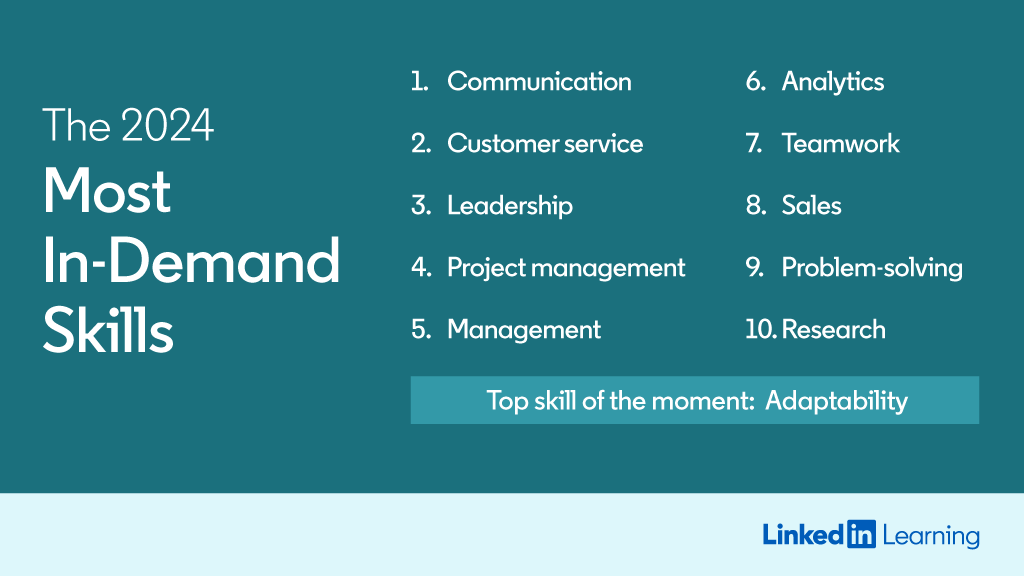
Today’s job market is dynamic and evolving at an extremely rapid pace. Possessing a diverse set of skills is crucial for career success and indispensable for long-term personal growth and compensation. Whether you’re starting your career or looking to enhance your current role, mastering these in-demand skills can set you apart from the crowd.
In this blog post, we’ll delve into 11 essential skills, offering practical examples and tips on how to develop them. From effective communication to strategic leadership, these 11 in-demand skills are highly sought after by employers across various industries. Let’s delve into each one and explore practical examples to help you enhance your professional toolkit.
- Read more about The Essential Role of Soft Skills in Career and Leadership
1. Communication
Effective communication is the cornerstone of any successful organization. It involves the ability to convey ideas clearly, listen actively, and adapt your messaging to different audiences. Strong communicators can articulate complex concepts, facilitate productive discussions, and build rapport with colleagues and clients.
Example: During a team meeting, you notice that some members seem confused about the project timeline. As an effective communicator, you take the initiative to clarify the deadlines, address concerns, and ensure everyone is on the same page.
Practical Examples:
- Email Etiquette: Use clear subject lines, concise language, and appropriate tone. For instance, when requesting a meeting, be specific about the agenda and desired outcomes.
- Active Listening: During meetings, practice active listening by summarizing key points and asking clarifying questions to ensure understanding.
Tips:
- Take a public speaking course to improve your verbal communication skills.
- Read books on effective writing to enhance your written communication.
2. Customer Service
In a customer-centric world, providing exceptional service is paramount. Customer service skills encompass active listening, empathy, problem-solving, and the ability to handle difficult situations with poise. Professionals with strong customer service skills can build lasting relationships, resolve conflicts, and ensure customer satisfaction.
Example: A customer contacts you with a complaint about a faulty product. You listen attentively, acknowledge their frustration, and offer a suitable solution, such as a replacement or refund. Your empathetic approach and prompt resolution leave the customer feeling valued and satisfied.
Practical Examples:
- Empathy: When a customer expresses frustration, acknowledge their feelings and apologize sincerely before offering a solution.
- Follow-Up: After resolving an issue, follow up with the customer to ensure their satisfaction and address any lingering concerns.
Tips:
- Participate in customer service training programs.
- Regularly review customer feedback to identify areas for improvement.
3. Leadership
Leadership skills are essential for inspiring and guiding teams towards common goals. Effective leaders possess qualities such as vision, strategic thinking, decision-making abilities, and the capacity to motivate and empower others. Strong leaders can navigate challenges, foster collaboration, and drive organizational success.
Example: As a team leader, you recognize that morale is low due to a recent setback. You gather your team, acknowledge their concerns, and outline a clear plan to overcome the obstacle. Your ability to inspire and provide direction helps rally the team and regain momentum.
Practical Examples:
- Delegation: Assign tasks based on team members’ strengths and provide the necessary resources and support.
- Mentorship: Offer guidance and support to less experienced colleagues to help them develop their skills.
Tips:
- Seek leadership roles in volunteer organizations or professional associations.
- Read books on leadership and attend leadership workshops.
- Check out Master of Project Academy’s Sandbox System Project Management Membership to learn to look at the big picture systematically.
- Check out Master of Project Academy’s Leadership Program
4. Project Management
Project management skills involve planning, organizing, and overseeing the successful execution of projects. Professionals with strong project management skills can set realistic timelines, allocate resources efficiently, mitigate risks, and ensure that projects are completed on time and within budget.
Example: You are tasked with launching a new product line. You create a detailed project plan, assign roles and responsibilities to team members, and establish regular check-ins to monitor progress. Your project management skills ensure that the launch is seamless and meets all stakeholder expectations.
Practical Examples:
- Time Management: Create detailed project timelines with milestones and deadlines to ensure timely completion.
- Risk Management: Identify potential risks early and develop contingency plans to mitigate them.
Tips:
- Obtain project management certifications, such as CAPM, PMP, and PMI-ACP.
- Use project management software like PowerBI, Trello or Asana to visualize, organize and track tasks.
5. Management
Management skills encompass the ability to oversee and coordinate teams, delegate tasks effectively, and foster a productive work environment. Successful managers can set clear expectations, provide constructive feedback, and make informed decisions that align with organizational goals.
Example: As a manager, you notice that workloads are unevenly distributed among your team members. You assess individual strengths and workloads, and redistribute tasks accordingly. Your effective management skills ensure that work is balanced, and team members feel supported and motivated.
Practical Examples:
- Performance Reviews: Conduct regular performance reviews to provide feedback and set goals for team members.
- Resource Allocation: Ensure that resources are allocated efficiently to maximize productivity.
Tips:
- Attend management training programs to learn best practices.
- Network with other managers to share experiences and insights.
6. Analytics
In the age of data-driven decision-making, analytics skills are highly valued. These skills involve the ability to collect, analyze, and interpret data to uncover insights and inform strategic decisions. Professionals with strong analytics skills can identify patterns, trends, and opportunities for improvement.
Example: You are tasked with analyzing customer purchasing behavior to inform marketing strategies. You gather data from various sources, perform statistical analyses, and present your findings to stakeholders. Your analytics skills help identify customer segments, predict buying patterns, and optimize marketing efforts for maximum impact.
Practical Examples:
- Data Visualization: Use tools like Tableau or Power BI to create visual representations of data that highlight trends and insights.
- A/B Testing: Conduct experiments to compare different approaches and determine which one yields better results.
Tips:
- Take courses in data analysis and statistics.
- Practice using analytical tools and software to analyze real-world data and visual intelligence software like Microsoft PowerBI.
- Check out Master of Project Academy’s Analytical Courses: Data Analytics in Excel, Excel for Business Analysts, Financial Forecasting and Modeling using Excel, and Microsoft Power BI Training.
7. Teamwork
Teamwork skills are essential for fostering collaboration, leveraging diverse perspectives, and achieving collective goals. Professionals with strong teamwork skills can contribute effectively to group efforts, resolve conflicts constructively, and create a positive and inclusive team dynamic.
Example: During a brainstorming session, you actively listen to your teammates’ ideas and build upon them, fostering a collaborative environment. Your ability to work well with others and embrace diverse viewpoints leads to innovative solutions that benefit the entire team.
Practical Examples:
- Collaboration: Participate in brainstorming sessions to generate ideas and solutions collectively.
- Conflict Resolution: Address conflicts promptly and facilitate discussions to find mutually agreeable solutions.
Tips:
- Engage in team-building activities to strengthen relationships with colleagues.
- Learn about different personality types and how to work effectively with each.
8. Sales
Sales skills involve the ability to identify customer needs, build rapport, and persuasively present products or services. Successful sales professionals possess strong communication skills, negotiation tactics, and the ability to overcome objections. They can effectively convey the value proposition and close deals.
Example: You are meeting with a potential client to pitch your company’s services. Through active listening and insightful questioning, you identify their specific pain points. You then tailor your pitch to highlight how your solutions can address their unique needs, ultimately securing their business.
Practical Examples:
- Needs Assessment: Ask probing questions to understand the customer’s needs and tailor your pitch accordingly.
- Closing Techniques: Use closing techniques, such as the assumptive close or the urgency close, to encourage customers to make a decision.
Tips:
- Attend sales training programs to learn advanced techniques.
- Practice your sales pitch with colleagues or mentors to refine your approach.
9. Problem-solving
Problem-solving skills involve the ability to identify and analyze issues, generate creative solutions, and implement effective strategies. Professionals with strong problem-solving skills can think critically, adapt to changing circumstances, and find innovative ways to overcome challenges.
Example: Your team encounters a technical issue that threatens to delay a critical project deadline. You gather relevant information, analyze the root cause, and propose a viable solution that minimizes disruption. Your problem-solving skills enable you to navigate the obstacles and keep the project on track.
Practical Examples:
- Root Cause Analysis: Use tools like the 5 Whys or fishbone diagram to identify the root cause of a problem.
- Brainstorming: Organize brainstorming sessions with team members to generate a wide range of potential solutions.
Tips:
- Develop a systematic approach to problem-solving, such as the PDCA cycle (Plan, Do, Check, Act).
- Stay updated on industry trends and best practices to apply innovative solutions.
- Check out Master of Project Academy’s Sandbox System Project Management Membership to problem solve with the big picture in mind.
10. Research
Research skills involve the ability to gather, evaluate, and synthesize information from various sources to support decision-making or advance knowledge. Professionals with strong research skills can identify credible sources, analyze data objectively, and present findings in a clear and compelling manner.
Example: You are tasked with conducting market research to assess the viability of a new product line. You gather data from industry reports, consumer surveys, and competitor analysis. Your research skills enable you to identify market trends, consumer preferences, and potential opportunities or risks, informing the product development strategy.
Practical Examples:
- Literature Review: Conduct thorough literature reviews to gather existing knowledge and identify gaps.
- Surveys and Interviews: Design and conduct surveys or interviews to collect primary data from relevant sources.
Tips:
- Take courses in research methods and techniques.
- Practice conducting research projects to hone your skills.
11. Adaptability
In today’s rapidly changing business landscape, adaptability is a highly valued skill. Adaptable professionals can embrace change, pivot strategies when necessary, and thrive in dynamic environments. They possess resilience, flexibility, and the ability to learn and apply new skills quickly.
Example: Your company undergoes a major restructuring, requiring your team to adopt new processes and technologies. You approach the change with an open mind, quickly upskill yourself, and support your colleagues through the transition. Your adaptability ensures that you and your team remain productive and effective despite the organizational shifts.
Practical Examples:
- Learning New Skills: Embrace opportunities to learn new technologies or methodologies that can enhance your performance.
- Flexibility in Role: Be open to taking on different roles and responsibilities as needed by the organization.
Tips:
- Challenge yourself by stepping out of your comfort zone regularly.
- Stay informed about industry trends and be proactive in acquiring new knowledge and skills.
By cultivating these 11 in-demand skills, you can position yourself as a valuable asset in the job market and contribute to the success of any organization. Remember, continuous learning and practice are key to mastering these skills and staying ahead in an ever-evolving professional landscape.
